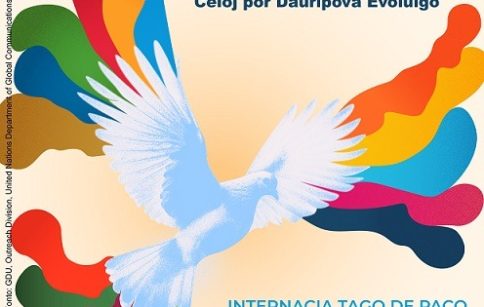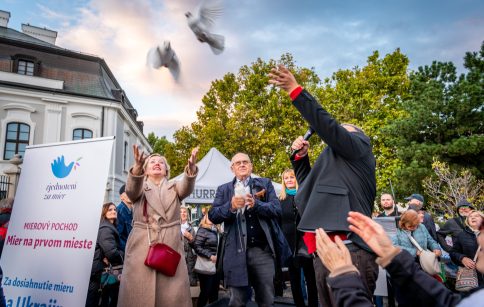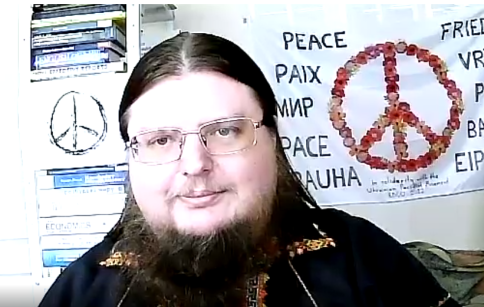We, the people of Central Europe, are concerned about the escalating war in Ukraine. We will never reconcile ourselves to the fratricidal conflict between the two largest and once inseparably linked Slavic nations. It was a mistake for the guarantors of the Minsk Agreements to resign themselves to upholding their validity. However, we strongly protest against Russian aggression in Ukraine and other revanchist claims. But we also understand the security concerns of Russia, which feels threatened by the current NATO political course. Above all, we stand in solidarity with the people of Donbas, who are suffering most from the consequences of war, and call for thorough protection of theirs national, social and civil rights. We empathise most strongly with these people, because they are the most severely tested and the most cruelly paying the price for the failure of politicians to keep their promises.
Our peoples remember very well what the occupation means. We have never reconciled ourselves to it, and we have never forgotten the occupiers, the five armies of the Warsaw Pact. But our peoples will always remember the wisdom of the politicians who did not allow the bloodshed of thousands of innocent people. Peace is hard work, and it requires from the people in power sensitivity and empathy with the people they are supposed to protect and defend. We declare that we oppose any policy that is intended to be a continuation of war. We have held this principle consistently, always, in the past, today and in the future, regardless of which power started the war. War has already spilled over into the people’s minds, we are fighting among ourselves instead of seeking together a way out, not an enemy. At the end of every weapon there is a human life, that is why we are against increasing armaments and against the supply of weapons to any of the belligerents.
We welcome the fact that both opposing camps – Moscow and Kiev – understand that this conflict can only be ended through diplomatic negotiations. At the same time, however, we see that they cannot find a way to achieve them. The fact that the belligerent states stubbornly make maximum demands or even refuse peace talks is nothing strange in this kind of wars. It is only proof that they cannot break the deadlock from which only a major diplomatic offensive can help them. In this context, we are concerned that the international community, and Western actors in particular, have not yet exerted any concerted pressure to start negotiations. We therefore call on the leaders of our countries, particularly the governments of Slovakia and the Czech Republic, that instead of sending weapons, prolonging the war and further bloodshed, they exerted maximum pressure for a diplomatic solution to the conflict, used all their contacts, international influence and comparative advantages arising from their unique cultural and geopolitical position to bring an end to the bloodshed in Ukraine as quickly as possible.
Warmongers are trying to tell the world that to come to an agreement means to capitulate, that mutual understanding is impossible and that peace can only be established by the victory of one and the defeat of the other. But historical experience shows us that this is not true, that people like James Carter, Javier Pérez de Cuéllar and Henry Kissinger achieved peace through negotiations, and it is no coincidence that they were awarded the Nobel Peace Prize for this. Starting negotiations is not a justification for war crimes. Negotiations do not mean dictating surrender to Ukraine. And negotiations do not mean ignoring the wishes of the parties involved. Negotiations are a necessary means of achieving a ceasefire, of preventing further suffering and the spread of conflict. Every additional day of war means hundreds more victims dying for goals that are less and less realistic.
It is worrying that the European Union is not playing its own game in this proxy war between two great powers. But it is maddening if it is taking steps that threaten its own energy and food security, even its own existence. It is therefore essential for European leaders to adopt a declaration that they have no interest in continuing the war and to adapt their future strategy accordingly. Europe’s first concern must be to restore peace on the continent, and to do this it must develop a strategy for ending the war as soon as possible. Continuing the war is not and must not be the solution to the problem.
One year on from Pope Francis’ memorable visit to Slovakia, when he called on us to make Slovakia ‘a message of peace at the heart of Europe’, we remind that our countries have so far done nothing to fulfil this vision, that they have not taken any diplomatic action to stop the bloodshed and enforce peace. However, both our nations must not stand on the sidelines, but must play an active role in the diplomatic resolution of the conflict. We desire our countries in the heart of Europe to be messengers of peace, not servants of war. This is also evident from the results of the 2021 National Values Survey, which ranked in the first place namely peace as the most important desired value.
We call on the statesmen who alone can stop the madness of war in Ukraine to show courage and responsibility for the people they lead. We call on the opposing parties to find the courage to come to the negotiating table and to seek a way out of this deadly situation with an open mind. We call on our domestic politicians not to forget their citizens, their security and their needs. Elections are only meaningful if those elected understand the responsibility they are taking on. Let the will of the men and women of every free republic be the supreme law. War is not in their interest. Politicians, act on their behalf!
Alexander Ač, researcher and columnist
Jozef Banáš, writer
Branislav Fábry, university lecturer, lawyer
Milan Daniel, journalist
Petr Drulák, former Deputy Foreign Minister of the Czech Republic, political scientist
Etela Farkašová, philosopher and writer
Karol Farkašovský, journalist, former Member of the National Assembly of the Slovak Republic
Milena Forejtníková, researcher, water economist
Ivan Gašparovič, former President of the Slovak Republic
Vladimír Godár, composer
Mária Gogová, lawyer
Eduard Grečner, film director
Marián Greksa, musician
Václav Hořejší, university professor, immunologist
Roman Hradecký, historian, chairman of the Prometheus Society – an association of secular humanists
Anton Hykisch, writer and former Slovak ambassador to Canada
Eduard Chmelár, historian and political analyst, president of the United for Peace
Alžbeta Jaďuďová, teacher emeritus
Peter Juza, university professor, political scientist and diplomat
Jan Kavan, former Minister of Foreign Affairs of the Czech Republic and President of the UN General Assembly
Iveta Kompišová, Chair of the Management Board of United for Peace
Mária Kráľovičová, actress
Arnošt Kult, watermaster
Ľudmila Lipková, university professor, economist
Eva Maliti Fraňová, writer and translator
Jozef Migaš, former President of the National Assembly of the Slovak Republic, Ambassador to Ukraine and Belarus
Dušan Mikolaj, writer
Ludvík Nábělek, doctor
Marek Obrtel, doctor
Ivan Popovič, artist, filmmaker and writer
Gabriela Rothmayerová, writer and publicist
Marek Vojtěch Řezanka, poet and publicist
Silvia Ruppeldtová, translator and publicist
Veronika Sušová-Salminen, historian and political analyst
Ilona Švihlíková, economist
Marie Švábová, architect
Jaroslav Turánek, university professor, biochemist
Božidara Turzonová, actress
Emil Višňovský, university professor, philosopher




